I resonated deeply with this webcomic that I came across, mostly because it describes the reality of my clients who are working with me, coaching on interpersonal communication skills, for career progression. This piece was created by Singapore’s very own The Woke Salaryman, and I think you might recognize yourself or a colleague in it.

1

2

3
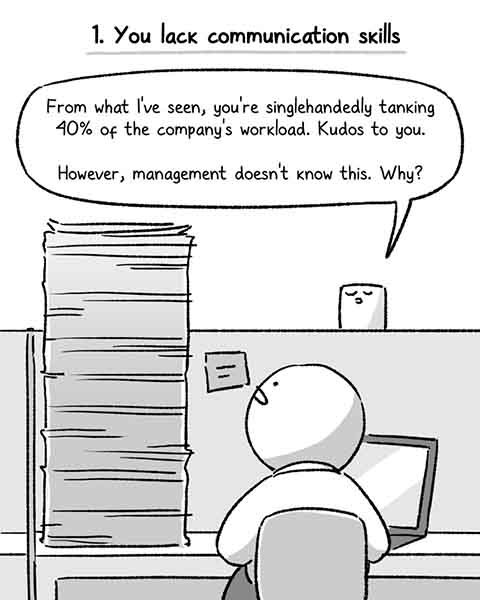
4
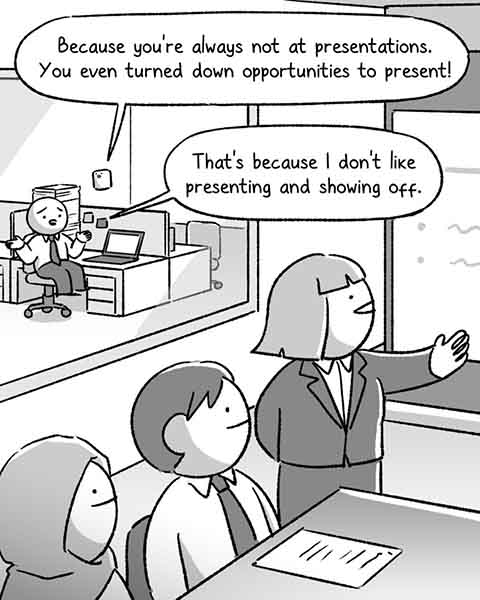
5
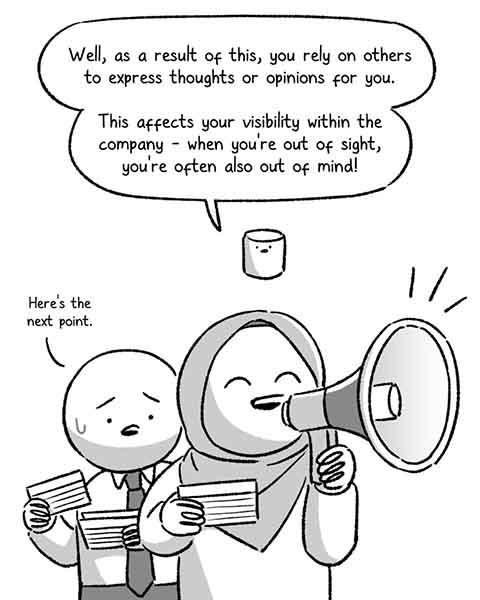
6

7
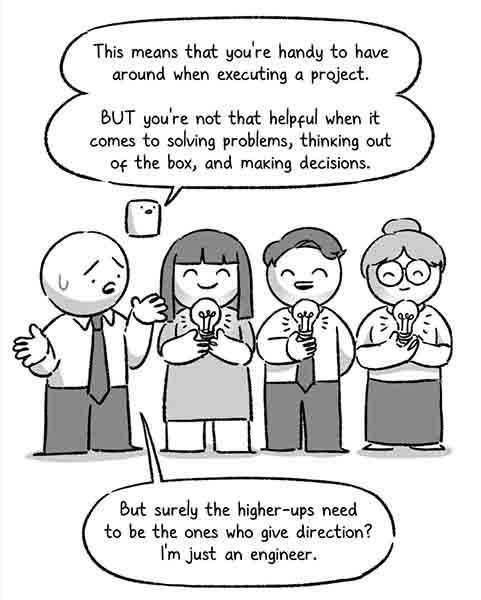
8

9

10

11

12
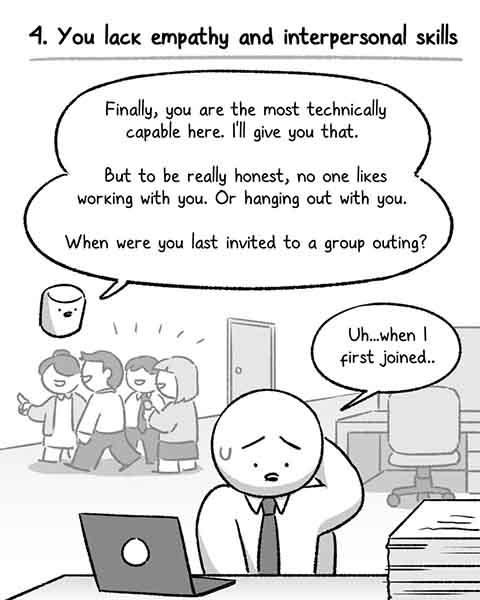
13
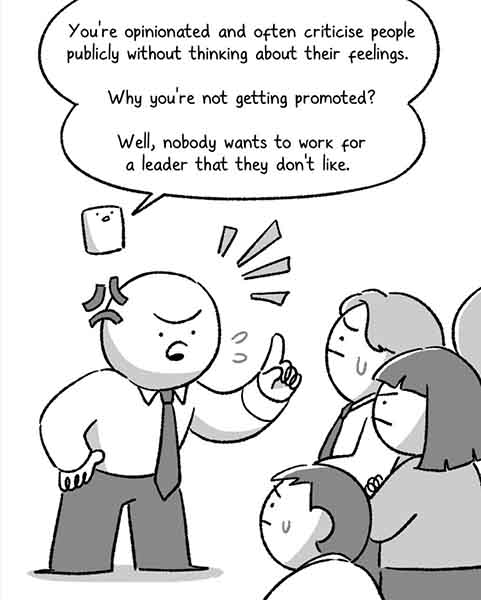
14

15

16
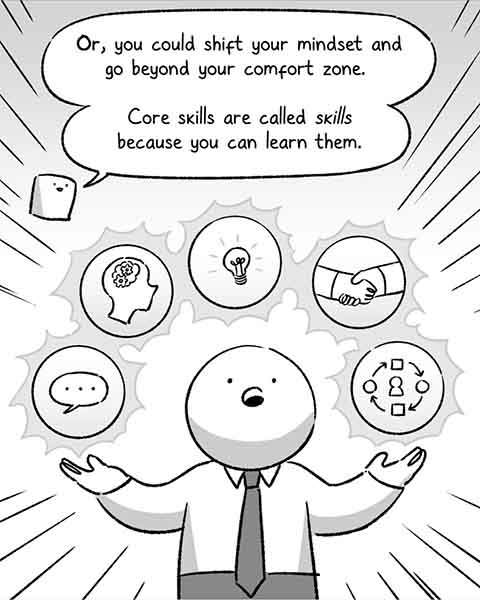
17
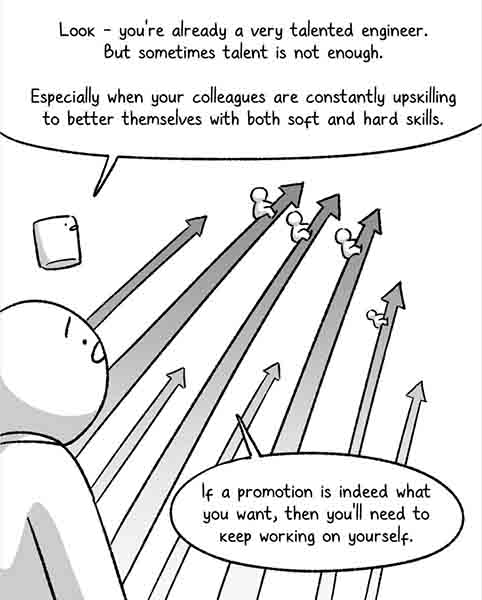
18

19
Interpersonal communication is a critical core skill at the workplace
Here’s my summary-cum-interpretation of the webcomic:
“I’m good at my job, but instead of me, others are getting promoted.”
Why? Because you lack CRITICAL CORE SKILLS (used to be called ‘soft skills’).
If you lack these critical core skills, your career progression can be hindered.
4 Critical Core Skills

Core skill ① – Communication skills
If you lack this, your visibility at your workplace is greatly diminished.
Core skill ② – Critical thinking and creativity
If you lack these, you’ll be pegged for a worker than a leader.
Core skill ③ – Adaptability
If you lack this, you might become irrelevant quickly.
Core skill ④ – Empathy and interpersonal skills
If you lack these… I would simply say you won’t be liked. More specifically, it will be harder for people to feel safe with you, and to trust you. And people want leaders with whom they can feel safe, and trust, in order to be productive.
Critical core skills CAN BE LEARNT (i.e. practiced).
You can PRACTICE into a way of being that fits the role that you wish to be promoted to. You can achieve such practice in less time and with less pain, through coaching.
Are interpersonal & communication skills more important than technical skills?
To be clear, I do not think that talkers are more valuable than doers; it is common sense to me that both are important in a commercially-viable organization. However, if you aspire to be promoted to a managerial or leadership role, I would suggest that you cannot do without good interpersonal communication skills. In some organizations, they call this ‘executive communication’. It’s the same stuff, just labelled differently.

Managerial and leadership roles require you to work with people. And that requires people skills. And guess what’s a major part of people skills? Communication. The ability to express yourself and understand others, and to coordinate actions. And as highlighted by our webcomic earlier, it also includes the ability to be empathetic. Consider the following description of what an organization is:
“An organization is a network of conversations, relationships and commitments, for the sake of a shared objective.”
If you resonate with this, it should be apparent to you how communication is the grease that oils the machine! Without effective communication skills, misunderstandings and waste of efforts might occur. If teammates lack empathy and interpersonal skills, trust levels will fall and conflicts will be frequent. People won’t make or won’t honor their commitments, which means work cannot get done!
Thus, you might also appreciate how interpersonal communication skills can be crucial at your workplace, even if you don’t desire a leadership role. Improving your communication and interpersonal skills at work can also make you a more valuable individual contributor!
Why talkers get promoted to leaders (and why executives get coaching on interpersonal communication skills)

“The Task of Leaders is to hold effective conversations. Conversations make relationships; relationships make culture. And culture determines how everything is done.”
The performance of a team is determined in a huge part by its leaders’ ability to have effective conversations. This applies everywhere – when discussing and debating decisions, as well as when supporting a teammate to manage personal issues so they can still function professionally. Or, facilitating understanding between teammates so people can collaborate more efficiently.
That is why there is often a premium placed on the ability to communicate effectively. It’s not necessarily because ‘leaders talk only, and do not work with their hands’, but more because communication skills are what’s core to leadership.
The clarity in how you express your thoughts.
The tact with which you assert your point.
Your confidence as you ask for things and elicit promises.
Taking care of relationships so that it’s easier for you to accomplish objectives.

All these leadership activities occur in conversation. Higher communication skills are demanded of you the higher you wish to progress. Definitely not a matter of ‘talk only’, is it?
Coaching on interpersonal communication skills for progression at the workplace
These are why many of my clients seek me out, first and foremost for communication coaching. For them, effective communication and interpersonal skills are not merely nice-to-have. They want to learn how to communicate confidently at work because it will open or even accelerate their career progression. One client told me his version of some words I often hear:
“For me to be promoted, I’ve been told I need to improve my leadership. Mainly, I need to have better executive communication. I need to be confident, clear and effective.”

5 Signs that you need to improve your interpersonal communication skills
The most common pain-points around communication and interpersonal skills I hear include:
- “People often tell me they don’t understand what I’m trying to say.”
- “People say I’m beating around the bush, and asks me to ‘get to the point’.”
- “People comment I’m too quiet, and tells me to speak up more.”
- “People don’t acknowledge, or ignore my verbal contributions.”
- “People say I’m too emotional, too harsh or too blunt.”
How coaching on interpersonal communication skills can help you
Through personal coaching, you can improve your communication and reclaim your confidence in your professional interactions. Coaching on interpersonal communication skills is familiar territory I’ve visited with clients on over the years, as a full-time life coach, specializing in communication and confidence.
Every coaching engagement is unique, because each client has different needs, weaknesses and strengths. However, there are processes that unfold every single time:
- Through open exploration and in-depth reflection, we will uncover your blindspots.
- Once you can see the cause or nature of your issue, you might also be able to see how you can do things differently so you get different result.
- I can also guide you to try new ways of saying or doing things, that are effective and feel authentic for you.
- Together, we will co-create practices that you can adopt, to assimilate what you learn into your regular way of being.
- I will provide you with honest feedback which you can use to calibrate and fine-tune your new skills.
If you can see how targeted and customized this is, you would understand why coaching on interpersonal communication skills can give you that extra edge in your career progression.
What coaching is
Coaching is a form of super-customised learning, focused solely on your needs. It is one of the most dignified forms of professional help, because you choose the topic, direction and depth of what you wish to work on.
In fact, my clients are NOT ‘broken’ in any way. They are capable, creative and self-initiated individuals who want to live out their full potential. Many of them are high-performers at their workplace, who want coaching on interpersonal communication skills to round out their already impressive skillsets.
They welcome more support to help them hit their objectives more quickly and with less pain.
If taking ownership of your growth appeals to you, coaching is might be suitable for you.
WhatsApp me now, to find out how you and I can work together on your communication and confidence.
"A good coach can change the game. A great coach can change a life."
~ John R. Wooden















